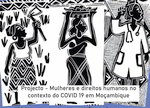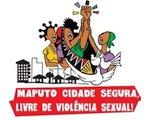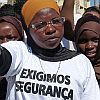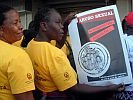The eradication of child marriages as a challenge for the full protection of children’s rights
By: Cristina Hunguana
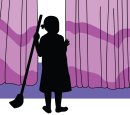 This year International Children’s Day, June 1st, is celebrated under the motto “All together against child marriage”.
This year International Children’s Day, June 1st, is celebrated under the motto “All together against child marriage”.
Child marriage or child unions, which are unions involving children, i.e., individuals under the age of 18 years, that are often forced, is a serious problem worldwide and Mozambique is not free from it, as it is among the 10 countries worldwide with the highest prevalence of child marriages. It is estimated that in our country 48% of children enter into marital unions before the age of 18 years, which represents almost one in every two children.
This happens regardless of the fact that the Mozambique Constitution contains a strong framework for the protection of the children’s rights, namely the article 47, which establishes in paragraph 1 that children have the right to protection and care required for their wellbeing and also that in all actions relating to children, performed either by public or by private institutions, they should take into account the child’s best interest.
Article 121 on childhood also stipulates that children, having in view their wellbeing, are entitled to protection by the family, the society and the State, against any form of discrimination, of abuse and againts the abusive exercise of authority in the family and in other institutions.
As far as civil law is concerned, there are also some legal provisions that could, in principle, be used to prevent the marriage of children. Article 30 paragraph 1 (a) establishes the age of 18 as the minimum age of marriage for both sexes, following international standards. However, it was this same article in its paragraph 2 that broke the above rule by allowing children under the age of 18 to enter into marriage provided they are over the age of 16 years, and if there are circumstances that can be considered as of public or familiar interest and if there is the consent of parents or legal representatives. The fact that the legislator did not establish parameters to settle what should be understood as circumstances of public or familiar interest, leaves an open door for many child marriages to occur.
Another weakness of the Civil Code provisions is that although it contains a prohibition of the marriage with children under 18, it does not contain sanctions to those who violate this rule, i.e. sanctions applicable to the adult who engages in marriage with children or for parents or legal representatives that allow their children to be married.
The Criminal Code has also not resolved this issue and adults who get involved with children may just be punished in the light of article 219, about statutory rape of children under 12 years of age and article 220 relating to sexual acts with minors, which does not solve the matter completely, considering that it does not protect all children under 18 years and also does not cover all the situations which can occur in situation of child marriage.
The criminalization of child marriage has been a recommendation on many forums that discuss the subject, as one way of eliminating it. In the wake of that recommendation the SADC Parliamentary Forum, through its Permanent Commission on Human and Social Development, has developed a model law on child marriage, approved during the 39th plenary Assembly of the SADC Parliamentary Forum, held in June 2016 in Swaziland, aiming to set a model for the countries of the region to draft their own national laws. One of the recommendations of this law is that the countries of the region adopt measures for the criminalization of child marriages. Thus, it is expected that in the near future, the Mozambican legislator will adopt a national law based on the SADC model law and we expect that this will contribute to the eradication of this serious harm to our children and to our society.







 Information in English
Information in English